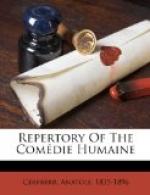In the opening pages of Facino Cane this phenomenon is thus described: “With me observation had become intuitive from early youth. It penetrated the soul without neglecting the body, or rather it seized so completely the external details that it went beyond them. It gave me the faculty of living the life of the individual over whom it obtained control, and allowed me to substitute myself for him like the dervish in Arabian Nights assumed the soul and the body of persons over whom he pronounced certain words.” And he adds, after describing how he followed a workman and his wife along the street: “I could espouse their very life, I felt their rags on my back. I trod in their tattered shoes. Their desires, their needs, all passed into my soul, or my soul passed into them. It was the dream of a man awakened.” One day while he and a friend of his were watching a beggar pass by, the friend was so astonished to see Balzac touch his own sleeve; he seemed to feel the rent which gaped at the elbow of the beggar.
Am I wrong in connecting this sort of imagination with that which one witnesses in fanatics of religious faith? With such a faculty Balzac could not be, like Edgar Poe, merely a narrator of nightmares. He was preserved from the fantastic by another gift which seems contradictory to the first. This visionary was in reality a philosopher, that is to say, an experimenter and a manipulator of general ideas. Proof of this may be found in his biography, which shows him to us, during his college days at Vendome, plunged into a whirl of abstract reading. The entire theological and occult library which he discovered in the old Oratorian institution was absorbed by the child, till he had to quit school sick, his brain benumbed by this strange opium. The story of Louis Lambert is a monograph of his own mind. During his youth and in the moments snatched from his profession, to what did he turn his attention? Still to general ideas. We find him an interested onlooker at the quarrel of Geoffroy Saint-Hilaire and Cuvier, troubling himself about the hypothesis of the unity of creation, and still dealing with mysticism; and, in fact, his romances abound in theories. There is not one of his works from which you cannot obtain abstract thoughts by the hundreds. If he describes, as in The Vicar of Tours, the woes of an old priest, he profits by the opportunity to exploit a theory concerning the development of




